Dear Editors, Subscribers & Friends,
Sarangani Province hosted the Alabel Education Summit 2007 on August 18 in coordination with Synergeia Foundation and the Department of Education at the Provincial Capitol Gym. The Sarangani Information Office would like to share this write-up by Dr. Milwida M. Guevara, with the author's permission.
Thank you.
Jun RamosProvincial Information Officer
The Sun Shone in the Midst of a Storm
(Building Dreams Together for the Children of Alabel)
Milwida M. Guevara
President, Synergeia Foundation[1]
and
Former Undersecretary, Department of Finance
The rain came in torrents in Manila. But the sun was shining in Alabel, Sarangani. Governor Migs Dominguez, their young Boston-educated governor, called all the Grade one parents to an “education summit”.
Many of them thought that this day must be important. Mayor Grafilo of Alabel sent invitation letters to all schools. Many of the schools were up in the mountains and sending a letter meant paying a “habal-habal” (tricycle) driver P300.00 per trip. Trucks were sent to fetch the parents. Many spent the night at the central school. Mothers came with their babies and the versatile “malong” that served as a hammock a blanket. They had a simple feast after cooking the rice that Mayor Grafilo sent. Councilor Espanol, who is one of the 5 students from Spring Alabel who made it to college, sent some fish.
The other parents were not as lucky. They walked some 2 to 3 hours from their homes to the “meeting point”. But the truck never made it. The tires gave way as the truck negotiated through very rough roads and seven streams. It must have been a frustrating night for them! The mayor sent word to the barangay captain to have them housed by the residents and to give them food. She asked me how we can make up to them for their disappointment.
The presence of about a thousand parents in the provincial gymnasium was a sight to behold. Many of the mothers were so young. One was only 17 and had her two children in tow. Some were wrapped in the traditional “kampong”. Chingkel noted that they did not appear poor. Their clothes were clean and tidy. The fathers came with the mothers. The smell of hope filled the air.
The parents responded heartily to the series of “ice-breakers” that Jan and Cecille gave. Men and women danced, waved their hands, and stomped their feet. They laughed as they called “workshop 6” (who was composed of guests seated on stage) to task. Each group called on Workshop 6 to stand up and respond to the roll-call by singing and dancing. Councilor Espanol sheepishly smiled and said that their “little gods” were not used to obeying commands from their foot soldiers. In a way, the foot soldiers found pleasure in getting even.
The Governor is a genius in communications. He gave an interactive speech with the aid of a PowerPoint presentation. But he spoke in their dialect and translated the materials in a form that tugged the strings of their hearts.
“Ang mga bata sa Alabel mahina sa Matematika. Dalawa lamang sa sampung tanong ang nasasagot nila ng tama. Kapag hindi sila marunong magbilang, lagi silang maloloko sa palengke, at, sa hanap-buhay. Hindi sila maaaring maging enhinyero o titser. Hindi rin sila maaaring mag-gobernador, kasi hindi sila marunong mabibilang ng boto.”
(The children of Alabel are weak in Math. They can only answer 2 out of 10 questions correctly. Thus, they can always be fooled in conducting businesses and in their lives. They will be unable to become engineers or teachers. They cannot become governor because they will not know how to count their votes.)
He asked for a show of hands for all those who thought that education is in a state of crisis. All hands were raised. He assured them that he will lead their movement to enable each child from Alabel to do well in reading and Mathematics. Sans Kris Aquino, he asked, “Deal or No Deal?” The gym shook with their resounding “Deal!”
“I ask that you close your eyes and imagine the future of your children. I have never asked you to make a promise to me except for now. Please raise your right palm and say that I will ensure that all my children will have a good future by helping them go through school”.
The crowd enthusiastically responded. With their LGU officials walking by their side, what is there to be afraid of? In that instance, I understood what “social capital” means. This program will succeed because the community trusts their officials who have committed to walk with them regardless of valleys and streams.
Synergeia has the advantage of giving them examples of communities that succeeded in improving the learning performance of their children. Former Mayor Diding Gamboa related to them how he organized parents and barangay school boards in supporting schools. He also engaged the youth in helping children to read and do math better. From 49.5 percent, the achievement level of children from E. Magalona, Negros Occidental moved up to almost 72.0 percent. I saw the Governor, the Mayor, and the councilors listening intently to Mayor Diding. There is nothing like a peer-LGU official mentoring his peers.
The next part of the summit was daunting. How do we listen to 1,000 parents? How do we ask them individually to articulate their dreams for their children and identify their learning problems? Thanks to Prof. Ernie Garilao who developed Synergeia’s technology of participation. The ever-efficient Ann gave each parent 6 cards and colored pencils which they should use for writing or drawing their answers. The parents grouped themselves into four in a very organized way. They lifted their chairs while those in the gallery joined the other workshops without a whimper. In the words of Rosanna Roces, it was “flawless”.
They were all kindred spirits in responding to the first question. Their dream was for their children to read, write and do math well. (Earlier, the governor coaxed them to aim to increase the children’s score to 100 percent). They wished that their children could finish college education and have good jobs. They wanted their children to be good citizens. In a breeze, our first conversation was completed.
The second question was about the difficulties that their children encounter in learning. After summarizing their answers, we asked them to add meaning and depth to their answers following the “one minute rule” to give as many parents an opportunity to speak. To our great surprise, the parents went up to the microphone, took turns in speaking, and gave brief answers upholding our rule. We were convinced that Filipinos are willing to follow rules as long as they know what they are for.
One parent brought the house down when he said that “he could not even say “a-e-i-o-u” well. How can he be expected to help his children read?”
The other parent said without reservation, “Malalayo po ang bahay naming taga-bundok sa paaralan. Naglalakad po ang aming mga anak hanggang tatlong oras.” (Our houses in the mountains are so far from school. Our children walk up to three hours to be able to go to school.)
The other stories related to hunger, poverty, shortage of teachers, instructional materials, and multi-grade classes. But the discussions did not get bogged down with problems that would take the national government to solve. They were quick to admit that many times, the parents fell short of their responsibilities. They asked their children to help them in farms or take care of their siblings which result to their frequent absences in school. They had no control over their TV viewing habits. When I asked whether they were willing to give up watching “Marimar” to spend the hour supervising homework or conversing with their children, they fell silent. Their Governor took the microphone and told them that he may be forced to formulate an ordinance which regulates TV viewing habits.
The parents candidly pointed to the growing size of their families as a constraint in enabling them to provide adequate attention to their children. The Mayor took the opportunity to inform the parents of the services that the LGU offers with respect to responsible parenthood. One father asked his peers to “limit the number of their spouses to only one.”[2] The Governor reminded the fathers that they are equally responsible for maintaining a family size that they can support.
The third part of the summit was the most important part. Now, each of the partners was to make specific commitments to the children of Alabel. I spoke in behalf of Father Ben Nebres, Mr. W. Sycip and the Trustees of Synergeia, as well as the Children’s Hour. I assured them that we will be their partner in building the capability of teachers, parents, and the LGU officials through training programs. We will also be providing each child with a workbook and learning exercises to connect each parent with what his/her child is learning in school. Each parent was requested to write what he/she will do for his child to enable him/her to at least complete elementary schooling. The governor told them that we will do one step at a time. After finishing grade six, then, we will aim for their secondary education---after that, college education could not be far behind. There was great silence as everybody thought hard about the gift that they will offer his/her child. A parent who did not know how to write asked Chingkel to write his promise: “I will bring my child to school every day”. Another who was literacy-disadvantaged drew a book and whispered that he will ask his child to relate to him his experiences in school for the day. Then, we asked them to go up the stage and hand their written commitment to the Governor and the Mayor. Again, we were surprised at how orderly they were. They formed one queue and almost took eternity because the governor read each of their commitment. He asked them to sign their names on their pledges.
It was the turn of the Governor to make a pledge. He turned the tables on them by saying that the future of their children depends on them. But not to fear, because he ‘will be by their side.
We shared a meal together in the gymnasium. The parents were reluctant to go. They seemed to want for more. “Kahit chika-chika lang.” We saw how participation can buoy up hopes and bind a community to work together for the welfare of the children.
Now we understand why the sun shines brightly in Alabel.
[1] Synergeia is a development organization that is dedicated to building communities to make education work. Please visit www.synergeia.org.ph for a description of its work.
[2] Tribal laws allow a man to take more than one spouse under specific conditions.
Thursday, September 6, 2007
Subscribe to:
Post Comments (Atom)




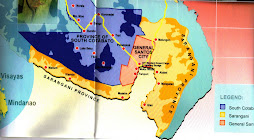

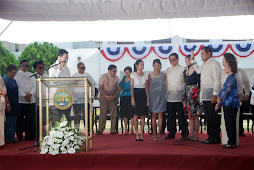
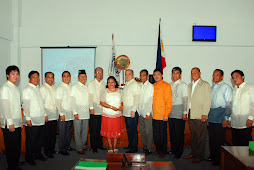

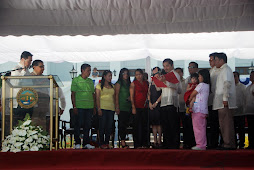
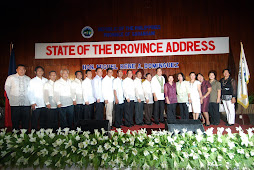
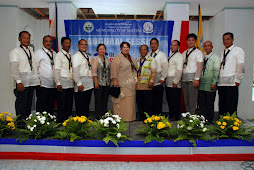
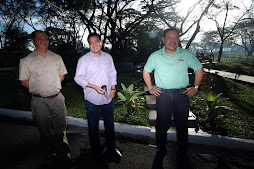



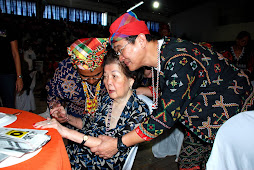


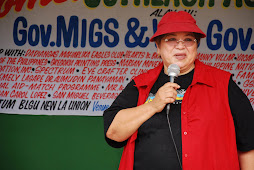

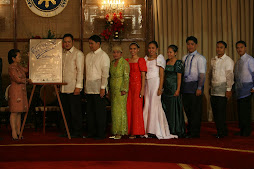
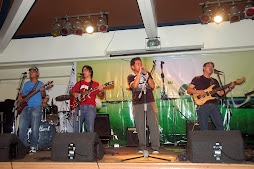









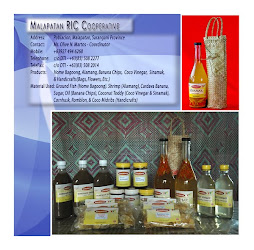

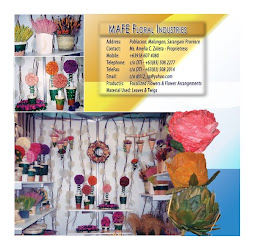


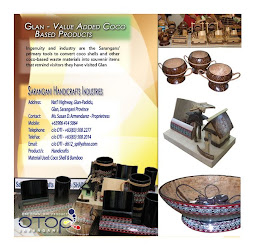





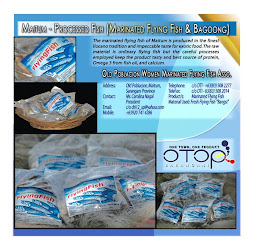
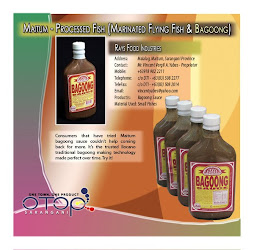







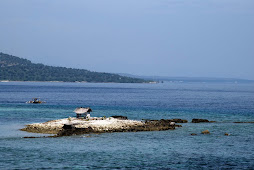
No comments:
Post a Comment